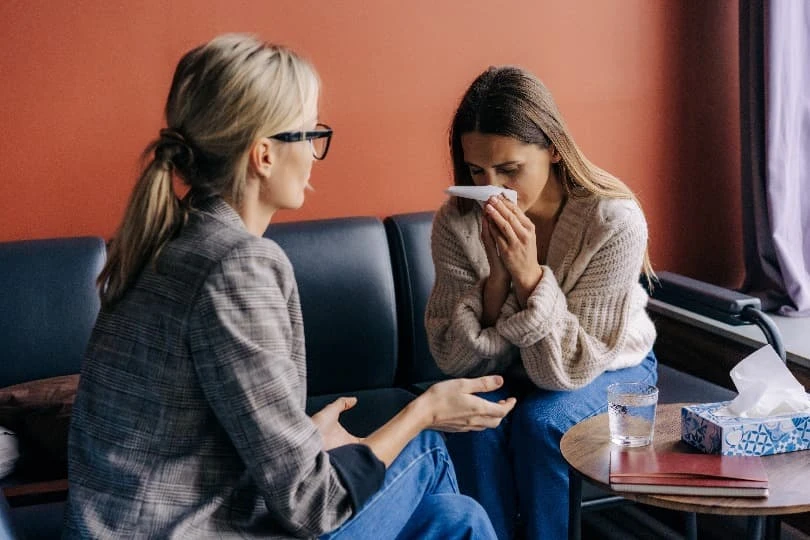“We’re done.” “I’m seeing someone else.” “I don’t love you anymore.” “I’ve met someone.” “It hasn’t been working for a long time…” Maybe you’ve heard similar phrases before or have personal experience with them. They all have one thing in common, and that word is BREAKUP. How do you cope with it?
One word, yet it hides so much pain, disappointment, fear, anxiety, and other emotions. These feelings often arise not only at the moment we get dumped but also just when we remember it.
And what about first unrequited love? That is usually very painful and intense mainly because it’s a new experience. Because of that, a breakup can seem like a tragic and fatal life event full of fear that we will never love anyone that much again. It’s hard to endure, struggle with, and move on from. Unfortunately, there are cases where it even leads to a tragic end.
So what to do? How to best cope with a breakup? What can help you, and what should you avoid? This article will address those questions.
Between Us Is the End, Also Known as a Breakup
A term that marks a major milestone in life’s development, especially when it’s about first love. The memory of it stays with each of us. There comes a time when illusions suddenly vanish. We believed we had found a soulmate, and with that loss comes the end of all joy and meaning in existence. Because of this, adolescents may turn to addictive substances or other forms of escape from emotions that are unpleasant and intangible. They don’t understand themselves, finding themselves on a deserted island, confused, lost, and feeling deep loneliness. They just want it to end. Parents and those around them don’t know how to properly behave toward those affected or how to help. They often downplay the situation, which can actually hurt the adolescent even more. So, what to do?
Phases of a breakup
To start, it’s good to understand what is happening to us and that the pain will end. A breakup has its gradual phases, and in each, we express emotions differently.
- Denial of reality – the most emotionally demanding phase, when we still try to save the relationship by all means.
- Struggling with emotions – now, seeing that the relationship probably can’t be saved, feelings of guilt, anger at the partner, fear, and searching for faults arise. Sometimes we lash out and feel life has no meaning without the other. We cry a lot and often try to escape the situation somehow. Support from those around us is very important in this phase.
- Acceptance – a very important phase full of hope. We come to terms with reality and seek a new path. The hardest feelings slowly leave us, and we gradually admit it’s time to move on. We might create profiles on dating sites, and new people enter our lives. We begin to believe again that things can get better.
- Victory and closure – in this phase, we take the breakup as a life experience, a lesson, something that can strengthen us and help clarify what we truly want from a partnership and how. Although it is still emotionally painful, we can see it as a valuable lesson that benefits future relationships, which may become more intense and vital because of it.
How to cope with it? What can help you feel better?
We have explained that a breakup can have certain phases, but how do you get through them with as little pain as possible? What will bring relief? Unfortunately, there is no universal guide for everyone—a cure that would heal us. Just as every person is unique, every relationship is unique, as is the way and length of experiencing its end. Time, support from others, and self-care play a crucial role. Unfortunately, often that alone is not enough, so here are a few tips on how to cope with it.

1 - Don’t suppress your emotions, experience them, and don’t be afraid to show them.
Allow yourself to cry, be angry, and experience exactly what you feel right now. Choose your own way to release emotions. It is important not to suppress feelings but to let them flow freely so relief can come, tension can ease, and grieving can take place. For example, go scream into the forest, punch a bag, or do whatever comes to mind. Don’t be afraid of your emotions. Don’t suppress your feelings, whether it’s anger, sadness, or fear. Remember, no one has a say in how you feel, and if you process your emotions in a reasonable way that doesn’t harm yourself or anyone else, it’s absolutely okay!
2 - Ask for support, confide in someone about what you’re going through.
It’s okay to ask for help when you’re not feeling well. You don’t have to face it alone. Try talking to someone close to you about what you’re experiencing. If you don’t trust anyone enough, don’t hesitate to seek professional help from therapists or call a helpline. Talking about what troubles you brings more relief than you might think. Even if you don’t feel like it at first, it’s good to at least try. Realize that you don’t have to fight your demons alone.
3 - Avoid contact with your ex-partner.
Right after a breakup, contact with an ex-partner is always a risk because it can create impressions and hopes that you might get back together. However, it’s important to realize that the breakup happened for reasons, and seeing your partner before the wound has healed only causes more pain. Therefore, try to avoid contact, at least in the beginning. In this situation, it helps to remind yourself of the reasons why the relationship ended, maybe even write them down and look at them whenever you feel the urge to reach out to your ex.
4 - Make a list of things you wanted to do but didn’t have time for because of your partner.
In a relationship, we forget ourselves and dedicate our free time to our partner. We neglect things that used to interest us or that we enjoyed before. Try making a list of these activities and include, for example, one each week in your daily routine. It could be something small, like going to the cinema or having coffee with a friend.
5 - Surround yourself with friends and gradually reintegrate into social life.
Although spending time with friends is supportive, it’s important to first give yourself enough space to heal. Don’t force yourself into something you’re not ready for. Don’t rush, don’t escape into another relationship, and don’t seek refuge in addictive substances. You can’t run away from the pain. If your recovery isn’t long enough, the wound may not heal properly. Listen to yourself and find out what you currently need.
6 - Give yourself enough space to cope with the breakup.
Although spending time with friends is supportive, it’s important to first give yourself enough space to heal. Don’t push yourself into something you’re not ready for. Don’t rush, don’t escape into another relationship, and don’t seek refuge in addictive substances. You can’t run away from the pain. If your recovery isn’t long enough, the wound may not heal properly. Listen to yourself and find out what you currently need.
7 - Live
Realize that you have the right to your own happiness. This advice may seem unimaginable to you now, but all the more effective in the healing process after a breakup. Find joy in small things, try to smile more at the people around you. Try to replace gloomy and negative thoughts with positive ones. Seek experiences, new opportunities, appreciate yourself and praise yourself, be with those with whom you feel good and comfortable. Life is too short to drown in self-pity, especially during adolescence when there are still so many things waiting to be discovered. In short: Don’t just survive, live!
Don’t hesitate to seek professional help as well.
The first breakup is one of the key life milestones we remember practically our whole lives. It hurts, but at the same time, it shows us the path we should or should not take. If you find yourself in this situation, feeling confused, and the advice above isn’t enough, don’t hesitate to schedule a consultation with a professional. Many therapists also work online, so you can get help within a matter of days.
This article was created under the auspices of Alive Cares.
Author: Mgr. Lucie Holubičková – addiction specialist, therapist






